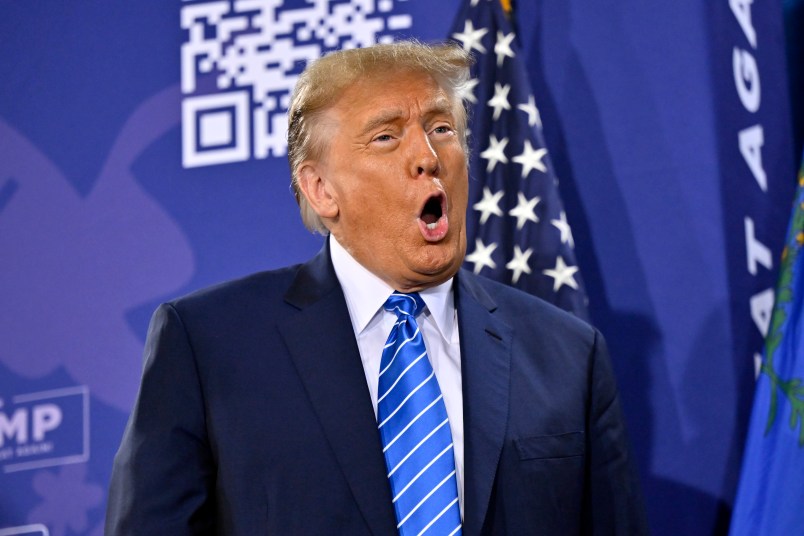In addition to a plainly corrupt and unconstitutional decision, SCOTUS appears to have added rules of evidence fine print which will likely invalidate Trump’s felony conviction. Here’s TPM Reader WT, a TPM alum and now lawyer (and expert commentator on Trump’s various New York litigations) …
Yesterday’s decision handed Trump an even bigger gift that initial headlines have suggested. SCOTUS has effectively federalized the two state prosecutions against him. (Note: As I type this, news is already breaking that Trump’s sentencing in his New York conviction is likely to be delayed.) Reading yesterday’s opinion, I’d be shocked if Trump ever gets sentenced. More likely, his NY conviction will get overturned before it even gets up to appeal.
Here’s why. Up to this point, the strength of prosecutions in Georgia and New York has been that they were largely, if not entirely, inoculated from intervention by the federal judiciary. Sure, there’s a narrow pathway from state courts to the Supreme Court, but New York and Georgia had lots of tools to prevent that outcome.) Not anymore. The kicker comes in Part III.A of the opinion, which constitutionalizes new rules of evidence for presidential prosecutions. (This section was the only bridge too far for Barrett, but it still got five votes and so is the law of the land.)
The majority’s decision, and Barrett’s concurrence, reads like a transcript of evidentiary hearings that happened throughout Trump’s New York trial. And, in short, the trial court adopted Barrett’s approach to considering evidence from Trump’s time in office—an approach which, as of yesterday, is unconstitutional (agains, see p. 31 of the majority’s opinion). Did any of that evidence actually matter to the outcome in New York? Who knows… and that’s the point. The trial court is going to be hard-pressed to say that any possible error here was harmless; SCOTUS went out of its way to say that admitting basically any such evidence is prejudicial.
Bottom line: Roberts has a knack for writing opinions that are bad on their face, and worse below the surface. Add Trump v. United states to the list of “worse than it looks.”
And follow up in a subsequent exchange …
Yup. First, the Court’s opinion takes a wide view of what counts as “official acts.” Second, the Opinion holds that the parsing of official from unofficial acts is something that has to happen before trial; we can’t rely on traditional rules of evidence to decide these issues in a piecemeal fashion during trial itself.* SCOTUS is pretty strident here, saying that admitting evidence of an official act would “eviscerate” immunity. Here’s the action, from page 31:
The President’s immune conduct would be subject to examination by a jury on the basis of generally applicable criminal laws. Use of evidence about such conduct, even when an indictment alleges only unofficial conduct, would thereby heighten the prospect that the President’s official decisionmaking will be distorted.
…
The Government asserts that these weighty concerns can be managed by the District Court through the use of “evidentiary rulings” and “jury instructions.” Brief for United States 46. But such tools are unlikely to protect adequately the President’s constitutional prerogatives. Presidential acts frequently deal with “matters likely to ‘arouse the most intense feelings.’ ” Fitzgerald, 457 U. S., at 752 (quoting Pierson, 386 U. S., at 554). Allowing prosecutors to ask or suggest that the jury probe official acts for which the President is immune would thus raise a unique risk that the jurors’ deliberations will be prejudiced by their views of the President’s policies and performance while in office. The prosaic tools on which the Government would have courts rely are an inadequate safeguard against the peculiar constitutional concerns implicated in the prosecution of a former President.
There’s no way that the NY trial court correctly analyzed evidence drawn from Trump’s time in office—how could it, when the rule didn’t exist then? But still, it seems impossible to say ex ante that all of the evidence let in was merely private. And, if anything let in was plausibly a public act, then SCOTUS’s opinion seems to say that a mistrial would be required.
*FWIF, the idea of immunity extending to evidentiary procedure isn’t entirely new. A similarly evidentiary bar has been applied to the Speech and Debate clause; this issue actually came up in some of the Mendez pre-trial hearings.






